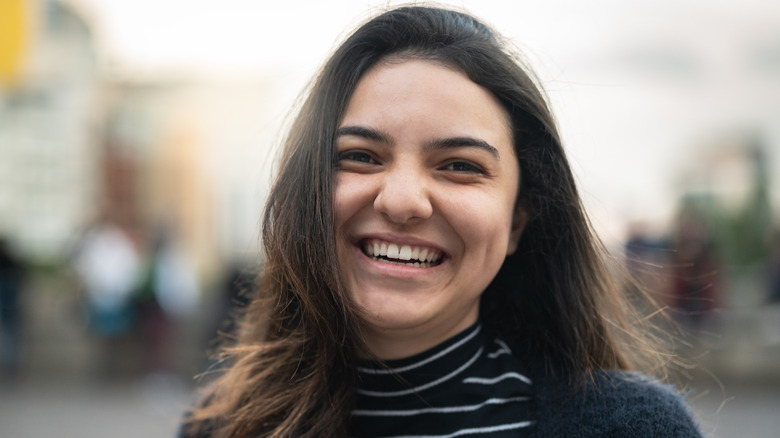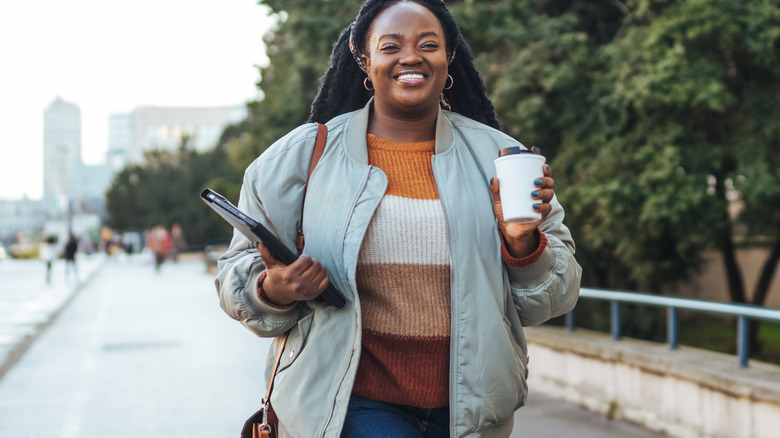Why Being Called 'Average' Looking Isn't Necessarily An Insult
Like it or not, our physical appearances matter a great deal in how we perceive each other. There are those whom society has deemed to be good looking, and so, we're bombarded with their images everywhere; those who are considered "unattractive" or, in being kind, have the type of beauty that requires an "acquired taste;" then there's everyone else — you know, the "average" looking people. But while it may not have the best ring to it, is being average really a bad thing?
If you're on the internet, it's easy to think that's the case, with adults of all ages turning to cosmetic procedures to meet an ever-changing standard of beauty. And truth be told, there is some merit to these pursuits; after all, people who are deemed as 'highly attractive' tend to be treated better by strangers, have an easier time landing jobs, and are general beneficiaries of what some call 'pretty privilege.' But while there's no denying these enviable benefits exist for the ridiculously good looking folks of the world, not being apart of that category isn't necessarily a bad thing. In fact, some research shows that being labeled as 'average' looking may actually have some legitimate advantages to it.
Average faces are considered the most attractive
Many of us had heard the expression 'easy on the eyes,' when describing someone who is considered exceptionally beautiful. But there's another side to that coin — easy on the brain — and in that category, average-looking faces win tenfold. In fact, per the findings in a 2014 study conducted at University of Texas in Austin, people process average-looking faces at a much faster rate than they do unattractive and beautiful faces. This partially explains why when people are asked to rank others based on attractiveness, they tend to favor those who are more typical looking, or whose faces are average of common features. Researchers believe because these ordinary faces are easier for the brain to interpret, they cause people to experience positive emotions when looking at them.
Other research supports this hypothesis, with a 2016 study published in The Royal Society of Publishing finding that men consistently rank women with simple-looking faces as most attractive. Some experts have suggested these preferences may be consistent across gender — and indeed, it is. In 2018, Oxford University's Internet Institute teamed up with eHarmony to analyze dating app messaging practices. The research found that heterosexual women were more likely to message an "average" looking man than one who might consider themselves a 10 on a scale of looks, per Refinery 29.
It's possible there's an evolutionary explanation for all of this, too. According to a 2011 study published in Philosophical Transactions B, those with average physical looks tend to have more diverse genes — something that has long been viewed as essential to breeding strong, healthy offspring. What all that boils down to is that when it comes to dating, or more specifically choosing a mate to procreate with, average looks make someone a hot commodity.
Average looking people are considered more trustworthy
According to a 2014 study published in Psychological Science, when we first meet someone, we subconsciously evaluate their face for signs of trustworthiness. And although the movies we watch growing up present us with heroes and 'good guys' who look like supermodels, research shows that in real life, we're more likely to trust someone with a very normal face over someone who looks like say, Zac Efron or Angelina Jolie.
Why is this? Well, psychologists hypothesize that this has to do with something called the mere exposure effect. "We do like what is familiar," psychologist Anthony Little tells Vice. "For example, the more times you hear a piece of music, the more positive you feel towards it. The same is true of abstract art — more familiarity means increased liking." The same applies to face recognition. When we see someone who reminds us of an old friend or neighbor, we feel more at ease, safe, and even happier than we are when faced with something completely foreign to our senses. This also explains why we might be drawn to those who look similarly to our parents or other people in our life with whom we've had good experiences and relationships.
Conversely, our feelings change when we come across someone who has features we aren't used to seeing."As people's faces get more distinctive — irrespective of whether it is more or less attractive — it gets less trustworthy," psychological scientist Dr. Carmel Sofer explains to Dufferin Research. So, next time a bit of AI software deems your looks as 'average,' try not to view it as an insult. If you're typical, it means your presence probably puts people at ease. And that's something worth celebrating.


